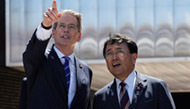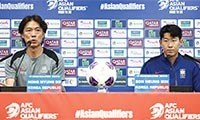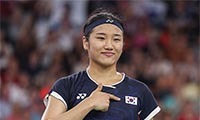DUBAI, United Arab Emirates - Ramadan is a holy month of praying and fasting, and for television executives it is a bonanza.
With ample time for family television viewing, pan-Arab channels save their best shows for Ramadan. In recent years none of the offerings have captured the collective imagination in quite the same way as “Freej,” the region’s first 3-D animated series.
The show finds humor along the dominant fault line of this city: the tension between old and new. It focuses on four secluded and sometimes stubborn grandmothers.
Its creator, the 31-year-old Mohammed Saeed Harib, is trying to expand “Freej” into a worldwide brand while maintaining its popularity here in Dubai, where viewers adore the four grandmothers who star in the 15-minute episodes. But the recession is not making it easy.
“Freej,” which swiftly became one of the most popular shows in the United Arab Emirates when it had its premiere here three years ago, is on a hiatus this Ramadan season, a result of the declining economy and, Mr. Harib says, his exhaustion after three grueling production cycles. In its place a new series of three-minute episodes starring the characters is being shown on local television.
Mr. Harib’s animated aspirations took shape a decade ago when he studied at Northeastern University in Boston, where his peers downloaded American cartoons in their dormitories. He recognized that his native emirate lacked homegrown characters and superheroes. “We don’t come from a land that has a lot of role models, except for C.E.O.’s and sheiks,” he said in an interview.
At Northeastern Mr. Harib started to sketch his first character, later named Um Saeed, a wise, petite lady in red who often leads the grandmas’ conversations. The cartoon he envisioned would extol grandmas as role models. Mr. Harib said that he imagined that the veil that partly covered a woman’s face would be the “costume of the superhero.”
The show tackles hot topics like wedding traditions and bribery in a distinctly Arab way, sometimes merely hinting at issues.
Mr. Harib hopes to make a “Freej” movie. To get there, he said his characters need to be dubbed into English. Already he has had one episode dubbed into Italian.
If “animation exports the cultural values of the nation,” as Mr. Harib put it, then he said he wanted “Freej” to continue to represent his native Gulf state.
“We are a minority in this country,” Mr. Harib said, referring to the fact that expatriates make up most of Dubai’s population. “We really need to sustain who we are.”
스마터리빙
more [ 건강]
[ 건강]이제 혈관 건강도 챙기자!
[현대해운]우리 눈에 보이지 않기 때문에 혈관 건강을 챙기는 것은 결코 쉽지 않은데요. 여러분은 혈관 건강을 유지하기 위해 어떤 노력을 하시나요?
 [ 건강]
[ 건강]내 몸이 건강해지는 과일궁합
 [ 라이프]
[ 라이프]벌레야 물럿거라! 천연 해충제 만들기
 [ 건강]
[ 건강]혈압 낮추는데 좋은 식품
[현대해운]혈관 건강은 주로 노화가 진행되면서 지켜야 할 문제라고 인식되어 왔습니다. 최근 생활 패턴과 식생활의 변화로 혈관의 노화 진행이 빨라지고
사람·사람들
more
“취미생활로 다진 친목… 선후배들과 만든 모교사랑”
사진러브한인 사진 동호회 사진러브(회장 크리스 고)는 13일 용수산에서 송년모임을 갖고 한 해를 마무리하는 뜻깊은 시간을 가졌다. 이날 모임에…

[홀인원] 이상원 박사
일반외과 전문의 이상원(왼쪽) 박사가 지난 9일 뉴포트비치 소재 골프장 9번 홀(152야드)에서 레스큐 클럽으로 친 샷이 그대로 홀에 빨려 들…
[송년행사 게시판] 재미시인협회
재미시인협회(회장 지성심)는 오는 20일 오후 4시 가든스윗호텔에서 한 해를 마무리하며 동인지 ‘외지’ 제35집 출판 기념회와 ‘제23회 재미…
[송년행사 게시판] 향군단체 연합
6.25 참전유공자회와 대한민국 육군협회 등 남가주 지역 향군 단체 연합은 19일 오전 11시30분, 용궁에서 송년 행사를 개최한다. 드레스코…
[송년행사 화보] “이웃과 함께 나누고 지인과 함…
KYCC13일 윌튼 플레이스 초등학교에서 열린 ‘한인타운청소년회관(KYCC) 홀리데이 카니발’이 성황리에 막을 내렸다. 올해는 KYCC 창립 …
많이 본 기사
- “1인당 2,000달러 환급금·세금 부담 역대 최저”
- ‘수퍼 독감’ 확산… 확진 4배 급증
- ‘반이민 가속페달’⋯ 시민권자도 대거 추방
- 거주·투자용 한국 부동산 인기… 한인 유치 ‘치열’
- ‘최강’ 안세영, 셔틀콕 왕중왕전 4강 진출 확정
- 전현무, 차량 링거 결국 입 열었다.. “의사 진료 처방..불법 NO”
- 잇단 총격·테러 음모… 한인타운 안전 우려
- 한국타이어, 테네시공장 증설… 생산 두배로
- 홍명보호, 최소 1,050만 달러… 8강 진출 시 2,050만 달러‘잭팟’
- 구리 절도 기승⋯ 가로등 ‘깜깜’
- 엔비디아·구글·오픈AI 등 빅테크들, 美 ‘제네시스 미션’ 합류
- 물가 둔화하나… 11월 소비자물가 2.7% 상승
- “연대의 빛으로 증오 극복”
- PSG, 인터콘티넨털컵 우승으로 6관왕 대기록
- 가주 실업률 5.6%로 상승… 전국 최고
- [만화경] 웰다잉 인센티브
- [캐슬린 파커 칼럼] 아이들을 온라인에서 보호하기
- [금요단상] AI와 동거, 그 실체
- 열대·사막·극지… 희귀 동식물 있는 ‘작은 지구’ 서천 생태원
- 현대차그룹, 차량 충돌 평가 ‘최고 등급’
- 내년 금리인하 전망… 연준 1회, 시장은 2회
- 2025년, 성찰과 감사의 마무리를
- 브라운대 총격 용의자 특정…MIT 교수 살해 연관성도 수사
- ‘아바타: 불과 재’… 압도적 스케일로 빚은 대서사
- [전익환 프로의 골프교실] 아이언 샷
- 오픈AI 가치 7,500억불 대규모 투자 유치 나서
- SK온, 포드와 합작 청산… 미 배터리공장 각자 운영
- 한인 부인 살해 혐의 남편 법정 출두 무죄 주장
- 제네시스, 비영리 단체들에 300만달러 지원
- 전국 소매판매 다시 부진 최근 5개월새 최저 수준
- AI 인프라 구축, 인허가 절차 완화
- 세일즈 걸들의 무료한 삶을 차가우면서도 동정하고 이해
- [LA필 새해 첫 콘서트]‘불과 빛, 그리고 음악의 환상적 융합’
- 차기 연준의장 곧 발표 트럼프, 3∼4명과 만나
- 신규 실업수당 감소 1주전보다 1만3천건↓
- 트럼프 행정부, 대마초 규제 완화
- [왈가 왈부] 고환율에 외환 건전성 완화·서학개미 규제… 미봉책 아닌가요
- “취미생활로 다진 친목… 선후배들과 만든 모교사랑”
- 박수홍 친형, 2심서 징역 3년 6개월 법정구속..형수 오열
- 팀스피릿 부동산그룹 송년모임
- 캐롤라이나 항공기 추락 조종사·일가족 7명 사망
- 한인 헤지펀드 거물, CNN 인수 추진
- [한국춘추] 경제대공황ㆍ제2차 세계대전 승리로 극복한 루스벨트 리더쉽
- “다카이치, 中갈등 속 내년 봄 美서 트럼프와 회담 추진”
- [화제] 베조스 전 부인… ‘기부의 여왕’ 변신
- 월드컵 입장권 폭등 비판 FIFA, ‘60달러’ 티켓 발매
- 5세 소녀를 구조하려는 요원들의 사투
- 오스카 시상식, 2029년부터 유튜브 생중계
- 허위광고 등 ‘연말 사기 주의보’
- “첼시 판 돈 우크라에 쓰라” 영국, 러 재벌에 최후 통첩
1/5지식톡

-
 ☝️해외에서도 가능한 한국어 선생님…
0
☝️해외에서도 가능한 한국어 선생님…
0이 영상 하나면 충분합니다!♥️상담신청문의♥️☝️ 문의 폭주로 '선착순 상담'만 진행합니다.☎️ : 02-6213-9094✨카카오톡ID : @GOODEDU77 (@골뱅이 꼭 붙여주셔야합니다…
-
 테슬라 자동차 시트커버 장착
0
테슬라 자동차 시트커버 장착
0테슬라 시트커버, 사놓고 아직 못 씌우셨죠?장착이 생각보다 쉽지 않습니다.20년 경력 전문가에게 맡기세요 — 깔끔하고 딱 맞게 장착해드립니다!장착비용:앞좌석: $40뒷좌석: $60앞·뒷좌석 …
-
 식당용 부탄가스
0
식당용 부탄가스
0식당용 부탄가스 홀세일 합니다 로스앤젤레스 다운타운 픽업 가능 안녕 하세요?강아지 & 고양이 모든 애완동물 / 반려동물 식품 & 모든 애완동물/반려동물 관련 제품들 전문적으로 홀세일/취급하는 회사 입니다 100% …
-
 ACSL 국제 컴퓨터 과학 대회, …
0
ACSL 국제 컴퓨터 과학 대회, …
0웹사이트 : www.eduspot.co.kr 카카오톡 상담하기 : https://pf.kakao.com/_BEQWxb블로그 : https://blog.naver.com/eduspotmain안녕하세요, 에듀스팟입니다…
-
 바디프렌드 안마의자 창고 리퍼브 세…
0
바디프렌드 안마의자 창고 리퍼브 세…
0거의 새제품급 리퍼브 안마의자 대방출 한다고 합니다!8월 23일(토)…24일(일) 단 이틀!특가 판매가Famille: $500 ~ $1,000Falcon: $1,500 ~ $2,500픽업 & 배송직접 픽업 가능LA…
케이타운 1번가
오피니언
 한영일 / 서울경제 논설위원
한영일 / 서울경제 논설위원[만화경] 웰다잉 인센티브
 캐슬린 파커 워싱턴포스트 칼럼니스트
캐슬린 파커 워싱턴포스트 칼럼니스트 [캐슬린 파커 칼럼] 아이들을 온라인에서 보호하기
 양상훈 수필가ㆍ시인
양상훈 수필가ㆍ시인 [한국춘추] 경제대공황ㆍ제2차 세계대전 승리로 극복한 루스벨트 리더쉽

[왈가 왈부] 고환율에 외환 건전성 완화·서학개미 규제… 미봉책 아닌가요
 수잔 최 한미가정상담소 이사장 가정법 전문 변호사
수잔 최 한미가정상담소 이사장 가정법 전문 변호사 [수잔 최 변호사의 LIFE &] AI 시대 편리함에 안주하지 말자
 김도년 성균관대 건축학과 교수 스마트도시·건축학회장
김도년 성균관대 건축학과 교수 스마트도시·건축학회장 [로터리] 지멘스가 만드는 미래 동네
1/3지사별 뉴스

‘브라운대 총기참사’ 뉴욕 한인학생도 총상
▶총상 입은 상황서도 동료학생 의식 잃지않도록 도와 ▶부친도 동문 “우리 가족에게 고통스러운 일”지난 13일 발생한 브라운대학교 총기난사(본보…
뉴욕주 안락사 합법화 초읽기 호쿨, “안전장치 마련되면 서명”

워싱턴 일원 소비 확 줄어들었다
올해 8월 워싱턴DC에 범죄와의 전쟁을 명분으로 주방위군이 본격적으로 배치된 가운데, 이 시기 이후부터 버지니아와 메릴랜드, DC 등 워싱턴 …
“북VA 주택시장 가격 급등 없다”

베이지역 스포츠팀, SF 한인회에 후원금
샌프란시스코 베이지역 한인회(회장 김한일)는 한인 메이저리거 이정후 선수의 소속팀인 샌프란시스코 자이언츠(San Francisco Giants…
불자커뮤니티 20일 청소년발표회및 송년회

오늘 하루 이 창 열지 않음 닫기 





















































.png)


댓글 안에 당신의 성숙함도 담아 주세요.
'오늘의 한마디'는 기사에 대하여 자신의 생각을 말하고 남의 생각을 들으며 서로 다양한 의견을 나누는 공간입니다. 그러나 간혹 불건전한 내용을 올리시는 분들이 계셔서 건전한 인터넷문화 정착을 위해 아래와 같은 운영원칙을 적용합니다.
자체 모니터링을 통해 아래에 해당하는 내용이 포함된 댓글이 발견되면 예고없이 삭제 조치를 하겠습니다.
불건전한 댓글을 올리거나, 이름에 비속어 및 상대방의 불쾌감을 주는 단어를 사용, 유명인 또는 특정 일반인을 사칭하는 경우 이용에 대한 차단 제재를 받을 수 있습니다. 차단될 경우, 일주일간 댓글을 달수 없게 됩니다.
명예훼손, 개인정보 유출, 욕설 등 법률에 위반되는 댓글은 관계 법령에 의거 민형사상 처벌을 받을 수 있으니 이용에 주의를 부탁드립니다.
Close
x